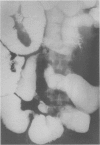Abstract
A controlled trial was performed to compare enteral feeding with either an amino acid based feed or a whole protein feed as sole treatment for active Crohn's disease. Twenty four patients were studied (nine with ileal, 11 with ileocolonic, and four with colonic disease). Both feeds proved effective; nine of 13 patients randomised to receive the amino acid based feed were in clinical remission within three weeks as defined by a simple activity index compared with eight of 11 treated with the whole protein feed. Patients in clinical remission were then crossed over onto the other feed. None of the six patients who were changed to the whole protein feed relapsed over the subsequent three week period compared with three of seven patients who were changed to the amino acid based feed. In responders the median serum C reactive protein concentration fell from 21 mg/l (range 9-82) on entry to 6 mg/l (range 3-19) at six weeks. Seven patients relapsed within eight months of starting solid food (mean 3.7 months), while nine were still in remission (follow up period 3-9 months, median six months). Detailed studies of staged reintroduction of food and permitted food additives were carried out over a four year period in a patient with extensive stricturing small bowel Crohn's disease who had been brought into remission by open treatment with enteral feeding. Carrageenan, other permitted emulsifiers, bread, meat, potatoes, oranges, refined sugar, dairy produce, flour, and rice were all reintroduced without any objective ill effect, but green vegetables provoked a clinical and biochemical relapse within one week of introduction. Remission was rapidly achieved by switching back to the enteral feed but reintroduction of the low residue diet that had been previously tolerated produced a brisk relapse. Clinical and biochemical remission was again achieved by a return to the enteral feed but relapse again occurred with reintroduction of the low residue diet. These studies confirm the therapeutic effect of enteral feeding in Crohn's disease. This effect does not seem to be due to avoidance of whole protein, but the very low residue of chemically defined enteral feeds may be important, particularly in patients with intestinal strictures.
Full text
PDF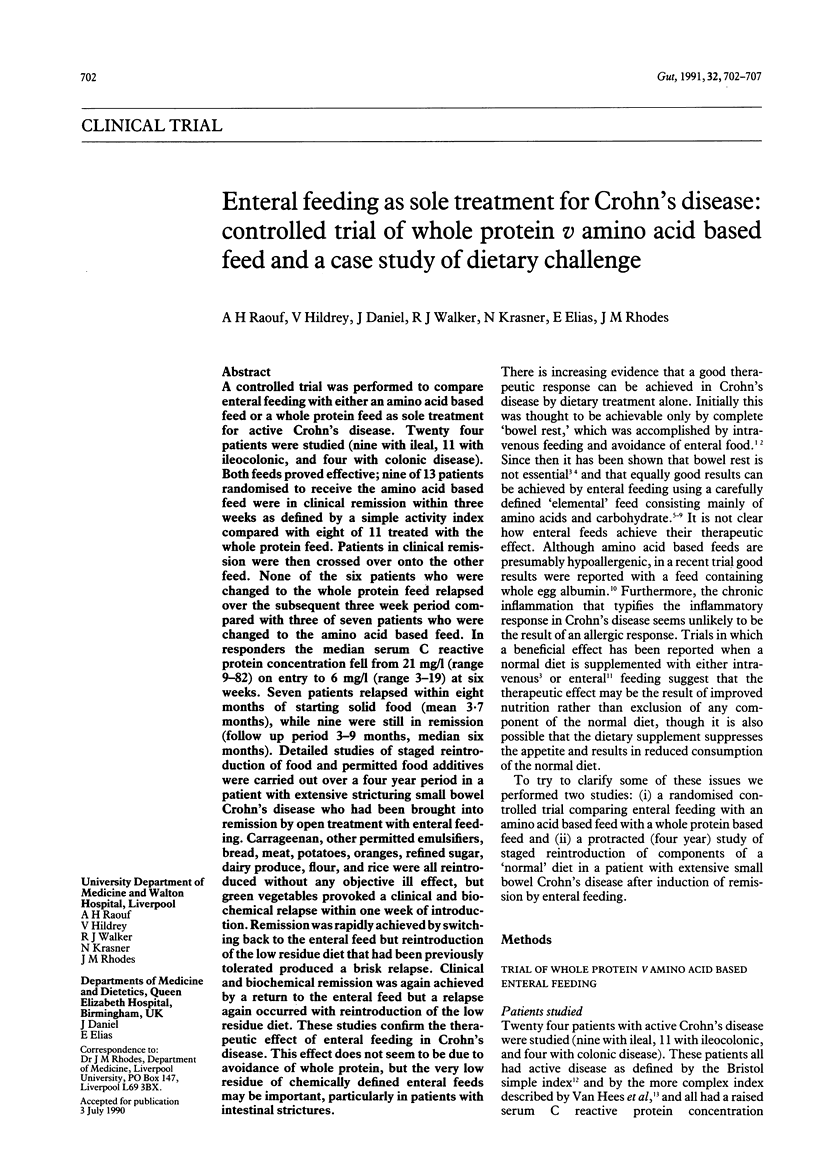
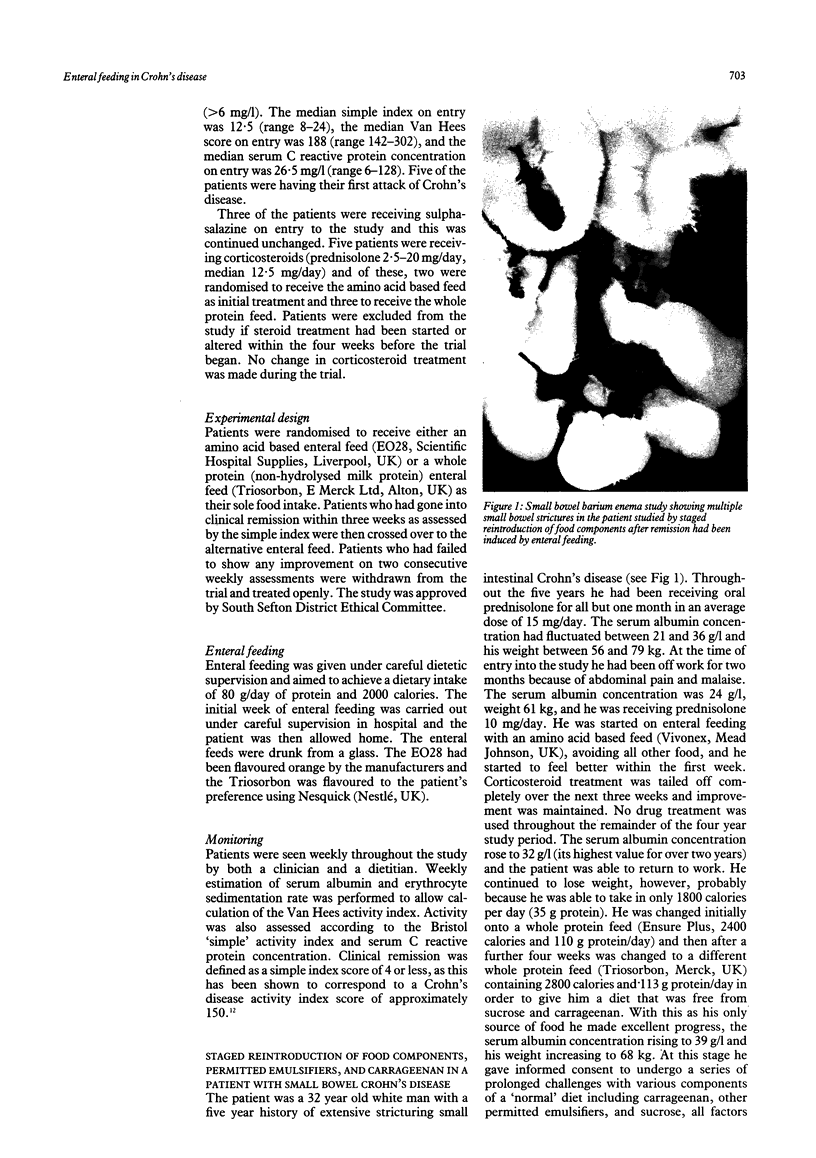
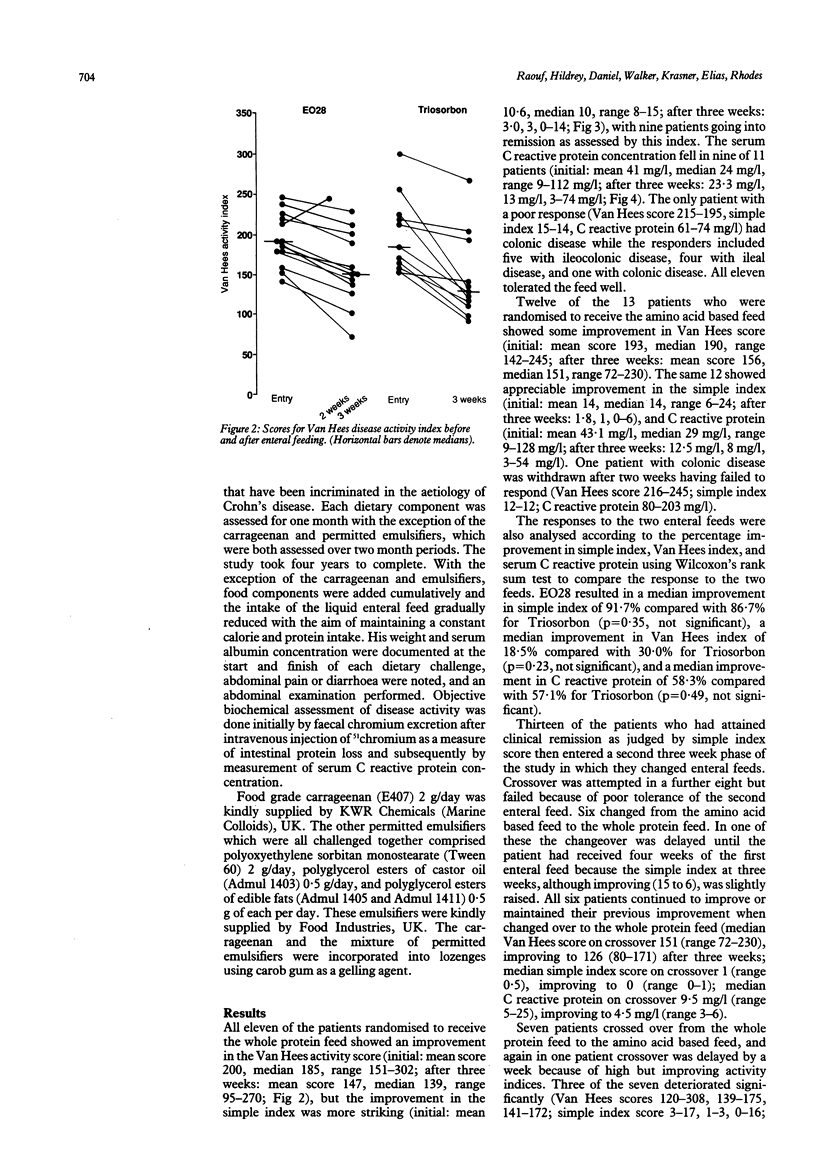
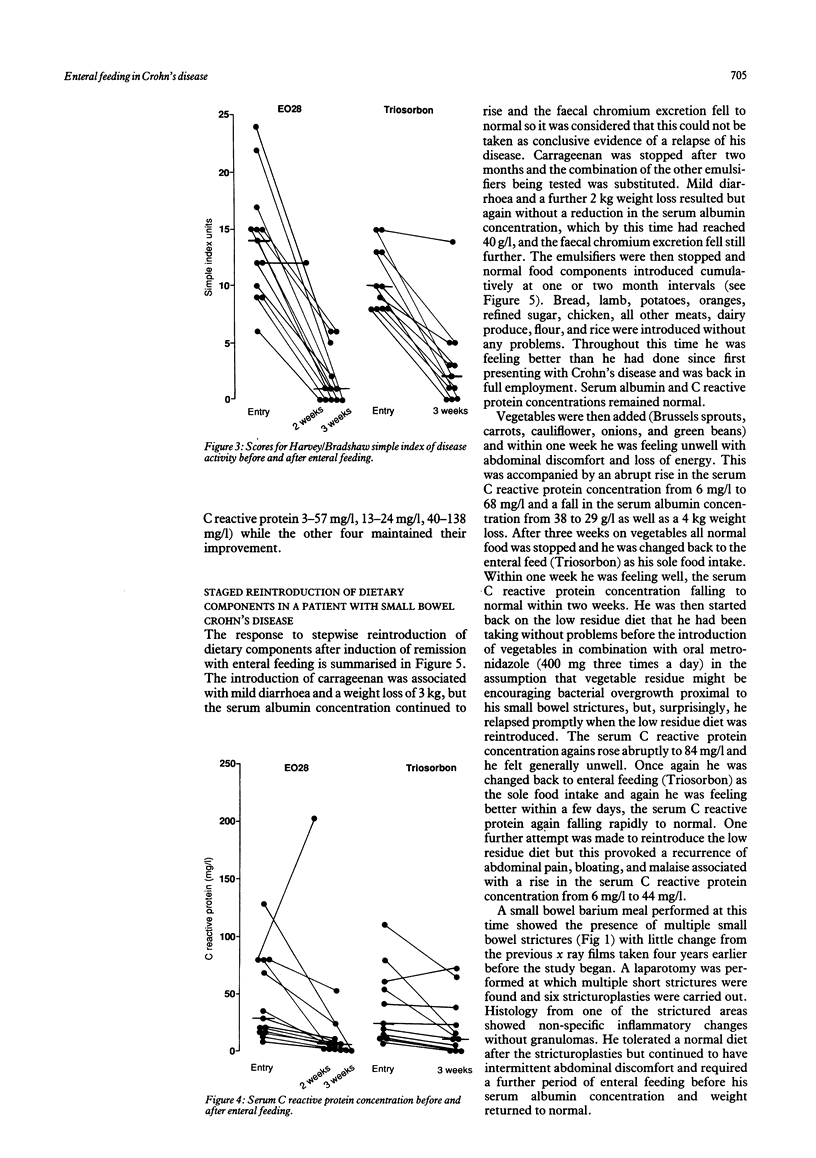
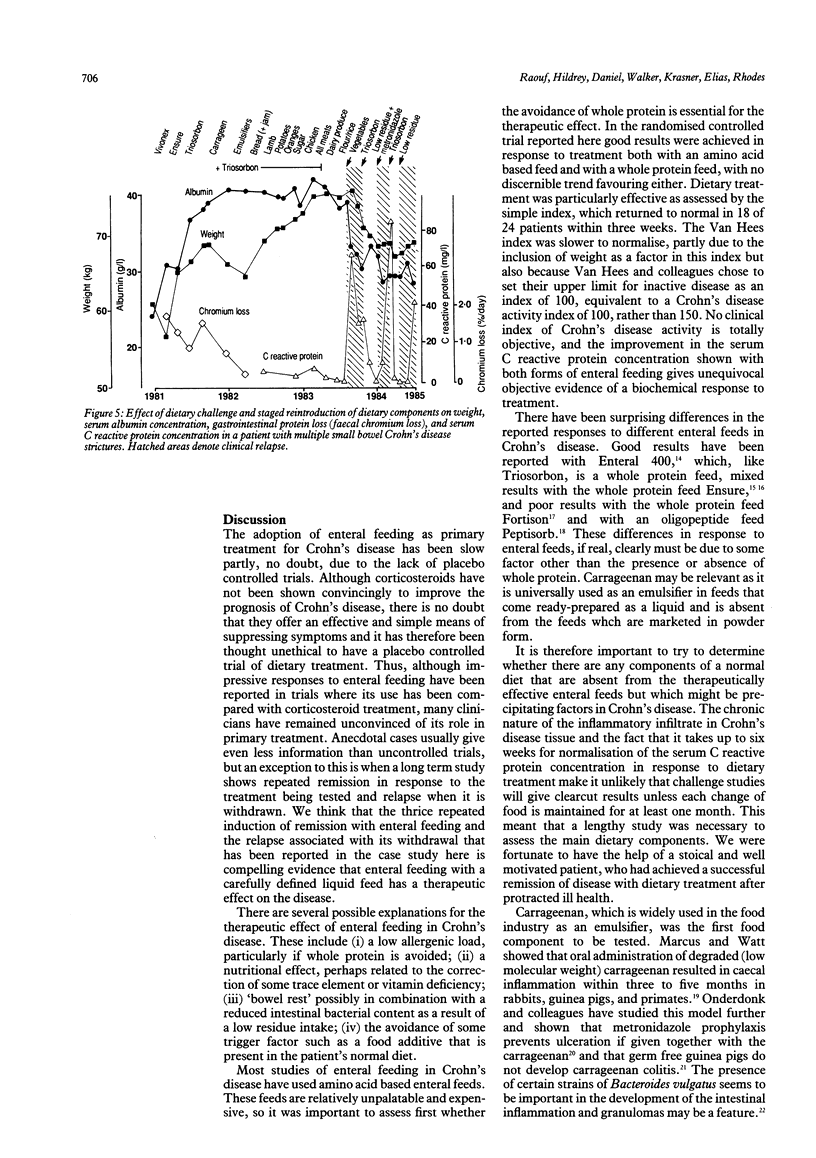
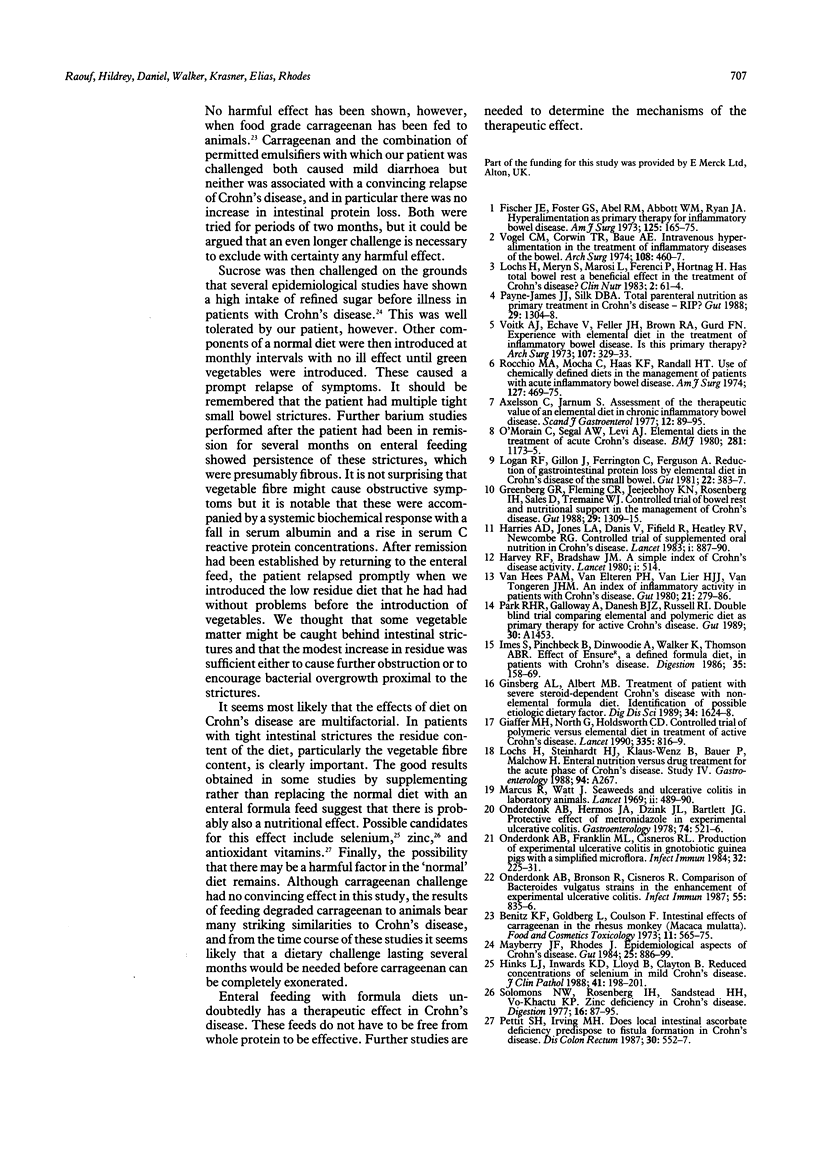
Images in this article
Selected References
These references are in PubMed. This may not be the complete list of references from this article.
- Axelsson C., Jarnum S. Assessment of the therapeutic value of an elemental diet in chronic inflammatory bowel disease. Scand J Gastroenterol. 1977;12(1):89–95. [PubMed] [Google Scholar]
- Benitz K. F., Golberg L., Coulston F. Intestinal effects of carrageenans in the rhesus monkey (Macaca mulatta). Food Cosmet Toxicol. 1973 Aug;11(4):565–575. doi: 10.1016/s0015-6264(73)80327-x. [DOI] [PubMed] [Google Scholar]
- Fischer J. E., Foster G. S., Abel R. M., Abbott W. M., Ryan J. A. Hyperalimentation as primary therapy for inflammatory bowel disease. Am J Surg. 1973 Feb;125(2):165–175. doi: 10.1016/0002-9610(73)90022-6. [DOI] [PubMed] [Google Scholar]
- Giaffer M. H., North G., Holdsworth C. D. Controlled trial of polymeric versus elemental diet in treatment of active Crohn's disease. Lancet. 1990 Apr 7;335(8693):816–819. doi: 10.1016/0140-6736(90)90936-y. [DOI] [PubMed] [Google Scholar]
- Ginsberg A. L., Albert M. B. Treatment of patient with severe steroid-dependent Crohn's disease with nonelemental formula diet. Identification of possible etiologic dietary factor. Dig Dis Sci. 1989 Oct;34(10):1624–1628. doi: 10.1007/BF01537124. [DOI] [PubMed] [Google Scholar]
- Greenberg G. R., Fleming C. R., Jeejeebhoy K. N., Rosenberg I. H., Sales D., Tremaine W. J. Controlled trial of bowel rest and nutritional support in the management of Crohn's disease. Gut. 1988 Oct;29(10):1309–1315. doi: 10.1136/gut.29.10.1309. [DOI] [PMC free article] [PubMed] [Google Scholar]
- Harries A. D., Jones L. A., Danis V., Fifield R., Heatley R. V., Newcombe R. G., Rhodes J. Controlled trial of supplemented oral nutrition in Crohn's disease. Lancet. 1983 Apr 23;1(8330):887–890. doi: 10.1016/s0140-6736(83)91325-9. [DOI] [PubMed] [Google Scholar]
- Harvey R. F., Bradshaw J. M. A simple index of Crohn's-disease activity. Lancet. 1980 Mar 8;1(8167):514–514. doi: 10.1016/s0140-6736(80)92767-1. [DOI] [PubMed] [Google Scholar]
- Hinks L. J., Inwards K. D., Lloyd B., Clayton B. Reduced concentrations of selenium in mild Crohn's disease. J Clin Pathol. 1988 Feb;41(2):198–201. doi: 10.1136/jcp.41.2.198. [DOI] [PMC free article] [PubMed] [Google Scholar]
- Imes S., Pinchbeck B., Dinwoodie A., Walker K., Thomson A. B. Effect of Ensure, a defined formula diet, in patients with Crohn's disease. Digestion. 1986;35(3):158–169. doi: 10.1159/000199362. [DOI] [PubMed] [Google Scholar]
- Lochs H., Meryn S., Marosi L., Ferenci P., Hörtnagl H. Has total bowel rest a beneficial effect in the treatment of Crohn's disease? Clin Nutr. 1983 Apr;2(1):61–64. doi: 10.1016/0261-5614(83)90033-x. [DOI] [PubMed] [Google Scholar]
- Logan R. F., Gillon J., Ferrington C., Ferguson A. Reduction of gastrointestinal protein loss by elemental diet in Crohn's disease of the small bowel. Gut. 1981 May;22(5):383–387. doi: 10.1136/gut.22.5.383. [DOI] [PMC free article] [PubMed] [Google Scholar]
- Marcus R., Watt J. Seaweeds and ulcerative colitis in laboratory animals. Lancet. 1969 Aug 30;2(7618):489–490. doi: 10.1016/s0140-6736(69)90187-1. [DOI] [PubMed] [Google Scholar]
- Mayberry J. F., Rhodes J. Epidemiological aspects of Crohn's disease: a review of the literature. Gut. 1984 Aug;25(8):886–899. doi: 10.1136/gut.25.8.886. [DOI] [PMC free article] [PubMed] [Google Scholar]
- O'Morain C., Segal A. W., Levi A. J. Elemental diets in treatment of acute Crohn's disease. Br Med J. 1980 Nov 1;281(6249):1173–1175. doi: 10.1136/bmj.281.6249.1173. [DOI] [PMC free article] [PubMed] [Google Scholar]
- Onderdonk A. B., Bronson R., Cisneros R. Comparison of Bacteroides vulgatus strains in the enhancement of experimental ulcerative colitis. Infect Immun. 1987 Mar;55(3):835–836. doi: 10.1128/iai.55.3.835-836.1987. [DOI] [PMC free article] [PubMed] [Google Scholar]
- Onderdonk A. B., Franklin M. L., Cisneros R. L. Production of experimental ulcerative colitis in gnotobiotic guinea pigs with simplified microflora. Infect Immun. 1981 Apr;32(1):225–231. doi: 10.1128/iai.32.1.225-231.1981. [DOI] [PMC free article] [PubMed] [Google Scholar]
- Onderdonk A. B., Hermos J. A., Dzink J. L., Bartlett J. G. Protective effect of metronidazole in experimental ulcerative colitis. Gastroenterology. 1978 Mar;74(3):521–526. [PubMed] [Google Scholar]
- Payne-James J. J., Silk D. B. Total parenteral nutrition as primary treatment in Crohn's disease--RIP? Gut. 1988 Oct;29(10):1304–1308. doi: 10.1136/gut.29.10.1304. [DOI] [PMC free article] [PubMed] [Google Scholar]
- Pettit S. H., Irving M. H. Does local intestinal ascorbate deficiency predispose to fistula formation in Crohn's disease. Dis Colon Rectum. 1987 Jul;30(7):552–557. doi: 10.1007/BF02554789. [DOI] [PubMed] [Google Scholar]
- Rocchio M. A., Cha C. J., Haas K. F., Randall H. T. Use of chemically defined diets in the management of patients with acute inflammatory bowel disease. Am J Surg. 1974 Apr;127(4):469–475. doi: 10.1016/0002-9610(74)90299-2. [DOI] [PubMed] [Google Scholar]
- Solomons N. W., Rosenberg I. H., Sandstead H. H., Vo-Khactu K. P. Zinc deficiency in Crohn's disease. Digestion. 1977;16(1-2):87–95. doi: 10.1159/000198059. [DOI] [PubMed] [Google Scholar]
- Vogel C. M., Corwin T. R., Baue A. E. Proceedings: Intravenous hyperalimentation in the treatment of inflammatory diseases of the bowel. Arch Surg. 1974 Apr;108(4):460–467. doi: 10.1001/archsurg.1974.01350280066012. [DOI] [PubMed] [Google Scholar]
- Voitk A. J., Echave V., Feller J. H., Brown R. A., Gurd F. N. Experience with elemental diet in the treatment of inflammatory bowel disease. Is this primary therapy? Arch Surg. 1973 Aug;107(2):329–333. doi: 10.1001/archsurg.1973.01350200189039. [DOI] [PubMed] [Google Scholar]
- van Hees P. A., van Elteren P. H., van Lier H. J., van Tongeren J. H. An index of inflammatory activity in patients with Crohn's disease. Gut. 1980 Apr;21(4):279–286. doi: 10.1136/gut.21.4.279. [DOI] [PMC free article] [PubMed] [Google Scholar]



